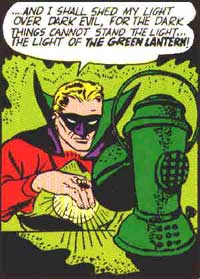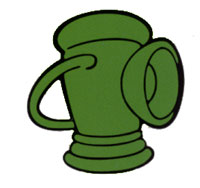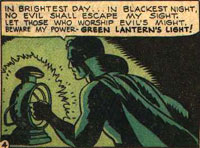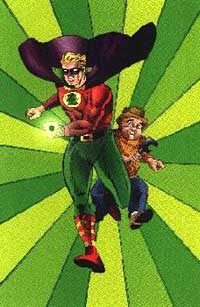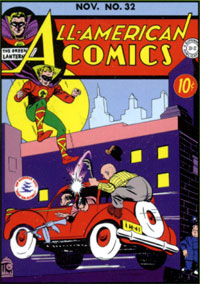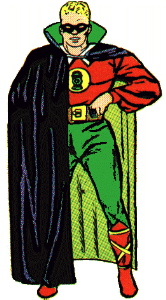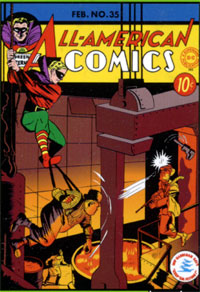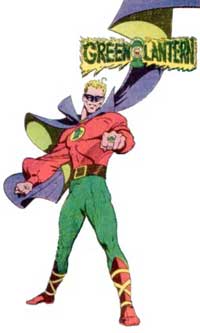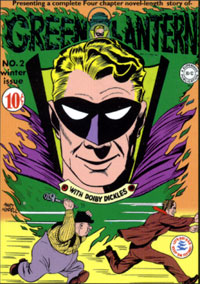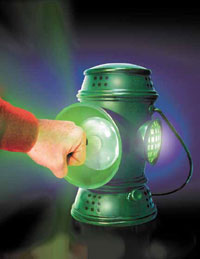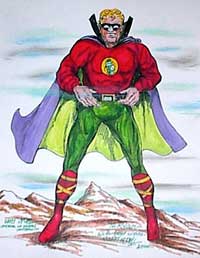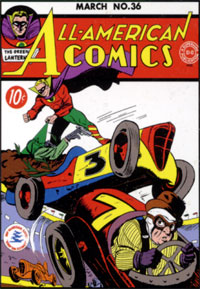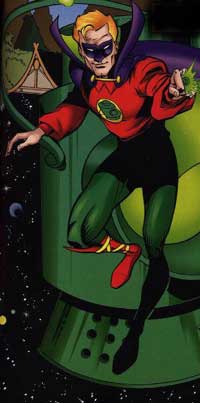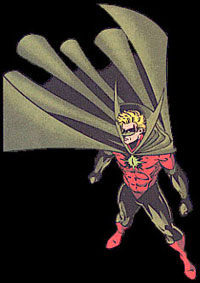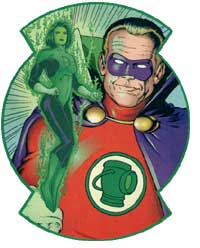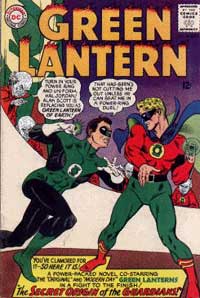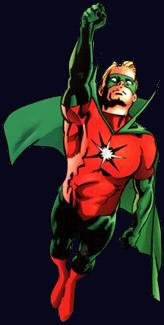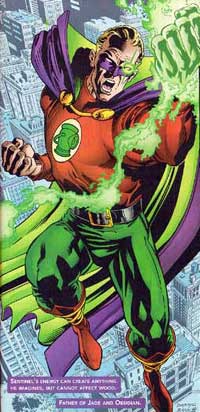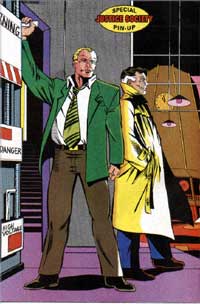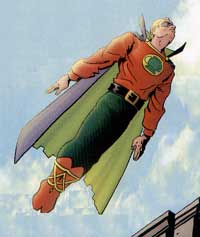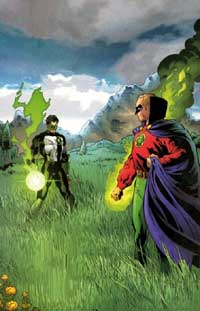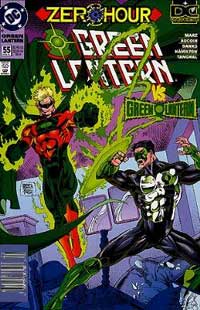Knowledge and Scholarship
History of the Golden Age Green Lantern
By Maven
May 6, 2003 - 11:34
Great Scott: Part One - In the Beginning
This article is the most thorough account of the history of the first Green Lantern, Alan Scott. It is an authorized and original essay written by the character's greatest fan. ComicBookBin hopes you enjoy it as much as we did.
Some say it all began billions of years ago, before the Sol system coalesced from its primordial gas cloud, back when the Guardians of the Universe won their final victory over the evil sorcerous Empire of Tears (GLCQ #7). They drained all of its black magic, then rounded up all of the "wild" magic in the universe, both good and evil, and imprisoned it all in the heart of a star.
As the eons passed, the magic became organized and sentient, and finally spat out a chunk of itself into the universe in search of a being worthy to be its champion (Green Lantern(2) 111-112). This mass reached Earth at least a thousand years ago in the form of a meteor with a stony shell and an interior of molten green metal. Some say that it intersected and fused with the dying consciousness and battery of a rogue member of the Green Lantern Corps, called Yalan Gur, who had just been handed a humiliating defeat by the "primitive" Earthlings with the covert assistance of the Guardians (Green Lantern(2) #19, GLCQ #7).
At all events, the meteorite fell to earth in China, where it broke open on impact and uttered the curious prophecy that it would flame green three times - "First - to bring death! Second - to bring life! Third - to bring power!" (All-American #16, Secret Origins #18, et al.) A metalworker named Chang, who had a local bad reputation as a sorcerer, took the meteorite home with him and worked it into an Aladdin-model lamp. But the terrified townspeople attacked him in his workshop - and the lamp flamed green, destroying them all and bringing the first prophecy to pass.
Over the centuries and across many lands it changed hands many times, bringing success and fortune to the good of heart - but ultimately bringing destruction on the wicked. At last some adventurers found it and brought it to America, where it wound up abandoned in a trashcan outside Arkham Asylum, near Gotham City (Secret Origins #18). An attendant gave it to an inmate named Billings, who loved to tinker with metal. Billings had been a wealthy man once, but had lost everything, including his mind, and killed his stockbroker (it is never clearly stated, but he was probably one of the many tragic victims of the 1929 stock market crash). Now he tinkered with the lamp, transforming it into a train lantern...and it flamed green a second time, restoring Billings' sanity and giving him a new life.
Great Scott: Part Two - The Gift
Its third and final gift was reserved for a man named Alan Scott, a young civil engineer who designed a bridge somewhere in the American West and participated in a test run along with another young man named Jimmy, who was apparently his partner and friend. The bridge was dynamited on the orders of a rival contractor named Dekker, and all aboard the train - save only Alan - were killed. Alan stumbled from the wreckage holding a curiously designed green train lantern, which burned with a hypnotic green light and took the opportunity to explain a short version of its history to him. The lantern advised him to form a ring of part of its metal so that he could have access to its power at all times, and cautioned him that the ring must touch the lantern once every 24 hours to retain this access.
Alan, finding his friend Jimmy among the dead in the wreckage, swore vengeance on Dekker, and brought it down upon him with the lantern's assistance, frightening Dekker into writing out a full confession of his crime - after which Dekker promptly dropped dead of a heart attack. During this adventure Alan discovered that he was quite immune to all metals, but that other materials could still harm him. He then adopted a costume that was "so bizarre that once seen, it will never be forgotten", and set about fighting crime and righting wrongs as "the Green Lantern". The green ring that he wore on the middle finger of his left hand was both the proximate source of his power, and his sigil.
His next recorded adventure took place in Metropolis (All-American #17), where he was working for a contractor named John Hall (presumably no relation to the many other Halls in the DC Universe), and involved exposing the crooked schemes of a grafting public official. During this adventure we have the first unequivocal statement that wood is a particular nemesis of the Green Lantern, although it was not yet his sole vulnerability. We also have the first of many times that the green ring left an indelible mark on an adversary.
The third recorded adventure (All-American #18) took place explicitly in New York, at the World's Fair, and introduced a character who would become important to him for some years - Irene Miller. He prevented her attempt to kill a notorious racketeer, leading to her explaining that the man had framed her brother for manslaughter. Alan promised to help and, as the Green Lantern, took actions that led to the racketeer's downfall (quite literally, from the top of the Perisphere) and his clearing Irene's brother with his dying words. (The brother has never been mentioned again.) Alan's interest in Irene was clearly demonstrated at the end of the story with a rather bold pass - when Irene started gushing about the Green Lantern, he said, "[H]ow about someone like me till he comes along?"
Great Scott: Part Three - Capitol City and Irene Miller
Nevertheless, his next adventure (All-American #19) found him alone again in an unspecified locale, where he thwarted an insidious racket that induced fools to gamble away their money, provided a loan with a life insurance policy as collateral...and then arranged fatal "accidents". Here we learn that the power of Alan's ring can be used to kill, at least indirectly.
All-American #20 settled him firmly in "Capitol City", where he re-encountered Irene Miller and got a job as a radio engineer at the firm she worked for, the Apex Broadcasting Company. (Where he learned enough about radio engineering to feel qualified in applying is an untold story, one of many.) There he stayed for some years, making the acquaintance of coworkers such as Tyler, a young newscaster; Charlie, a veteran announcer; the company's owner, a Mr. Wallace; and - most importantly of all - a cab driver by the name of "Doiby" Dickles (All-American #27). Doiby soon became the Green Lantern's right-hand man, and in the course of one early adventure (All- American #35) discovered that the man under the mask was Alan Scott.
"Capitol City", incidentally, was sometimes treated in these stories as just another alias for New York City...despite the fact that New York isn't even a state capital. It wasn't until All-Star #37 that it was finally and unequivocally revealed as an alias for Washington, D.C.
It was about this time that Alan met and formed a lasting friendship with another mystery-man, Jay Garrick (the Flash), of Keystone City and sometimes New York. Their first adventure together got off to an unpromising start, as the two heroes took an instant dislike to each other (Flash/Green Lantern: Faster Friends). But, while tracking down the mysterious "Alien X", they set their animosity aside to work together, found that they made a good team...and began to like each other after all.
Great Scott: Part Four - The Justice Society
That November, Green Lantern and the Flash were contacted by an agent of "Intrepid's" "British Security Coordination" and sent on an espionage mission that very nearly cost them their lives - and changed the course of history (DC Special #29, Secret Origins #31). With the assistance of six other mystery-men (Dr. Fate, Hourman, Sandman, Hawkman, Atom, and, last but by no means least, The Spectre), they aborted a German assault on Great Britain and saved Washington from a stealth bombing attack. The President suggested that the eight mystery-men ought to work together on a regular basis, and they decided to hold a dinner sometime soon and discuss the idea. The Spectre suggested a possible name for the group, "The Justice Society of America".
Word of the dinner got around the mystery-man set, partly because the eight issued discreet invitations to some of their more prominent colleagues, who politely declined. As a result, Johnny Thunder crashed the party with the assistance of his Thunderbolt, and the Red Tornado dropped by long enough to make her presence known (All-Star #3). At the end of the dinner, the group agreed to undertake a mission for the head of the Federal Bureau of Investigation (All-Star #4).
Green Lantern remained an active member of the JSA for only a short time, however. During the Ian Karkull affair (All-Star Squadron Annual #3), he failed to save a young boy from being killed by a falling tree, and, blaming his failure on overwork, stepped down to honorary membership. (All the other slated murder victims eventually went on to become President of the United States - but the boy GL couldn't save is not accounted for. It is possible that he was, or would have been, the father of Prez Rickard, and that this is the reason why there was never a "Teen President" in the mainstream DCU.)
A major turning point in Alan's relationship with Irene occurred that summer (Green Lantern #3). They were sent off together to Australia to do work for Apex, but wound up stranded with some fellow passengers (including stowaway Doiby Dickles) on a Shangri-La-like remote and uncharted Pacific island. After saving this paradise from the threat of a Nazi(!) invasion, Alan and the others made their escape back to "civilization". Alan's uncostumed heroics and their wistful memories of that far-off place drew him and Irene solidly together - and that may have revealed his secret to Irene, as he had previously kissed her in his masked identity (Green Lantern #1, "The Adventure of the Masquerading Mare") with the same enthusiasm that he now did as himself. (She would have had to be thick as a brick wall not to figure it out - but she never let on.)
Great Scott: Part Five - Military Service
Immediately after Pearl Harbor, Alan volunteered for the Army, and wound up as a lowly PFC under the watchful eye of Sergeant Dickles (Green Lantern #4, All-Star Squadron #20). His military career was undistinguished, partly because his covert activities as Green Lantern kept conflicting with his official duties and landing him on KP. On one such occasion (All-Star Squadron #20), he rescued his JSA and ASQ comrades from a hideous mental trap set by Brain Wave - but was himself nearly driven insane by an illusion in which he laid waste the entire country of Japan with the power of his ring. From then on he began to fear and mistrust the power that he wielded, and to use it with greater caution.
Alan's military service came to an abrupt end within about a year, as it came out that he was a radio engineer, and he was promptly discharged because his services were more valuable as a civilian (Green Lantern #7). Doiby Dickles soon got himself discharged also, and the pair spent a while as roving troubleshooters before relocating to Gotham City (sometime before All-American #61).
Between his absence in the military and his moving to another city, Alan's relationship with Irene Miller became strained, and at some point they broke it off (or were unable to resume it). She presumably remained in Capitol City, where she had built a life for herself (GL: Brightest Day, Darkest Night), while Alan moved on. What eventually became of her is unknown.
Alan obtained a position as radio engineer for Gotham's station WXYZ, eventually becoming a manager (Green Lantern #20), then vice-president of the Gotham Broadcasting Company (Justice Society miniseries #2), and eventually president and CEO (Green Lantern(2) #40). He also resumed full membership in the JSA (All-Star #24), and remained active until the group disbanded (for the first time) in 1951. One of his first requirements as a manager was to hire a secretary, and he made the fateful choice of Molly Maynne (All-American #89). She was just out of secretarial school, very young, impressionable, and eager to please, and soon developed a raging crush on the heroic Green Lantern - as well as on her handsome boss. It isn't clear when she figured out that they were one and the same, but figure it out she did (Green Lantern 80-Page Giant #1).
One of her early tasks was typing up a script for an upcoming "Green Lantern" radio adventure, "Green Lantern vs. the Harlequin", and this gave her the idea to take up the identity of the villainous Harlequin for real, so that Green Lantern would have to come after her (All-American #89). How she contacted the Manhunters, or they her, and why they gave her a pair of illusion-casting spectacles, is an untold story. But with them in hand - or on her face - she embarked on a career of petty villainy that utterly failed to bring her what she wanted most. At some point she was contacted by the FBI and became an undercover agent in the underworld (All-Star #41, Green Lantern #34) - but not even that could win her Alan's love. Finally, after making a last veiled appeal at the end of a kidnapping case they worked on together, she walked out of his life - forever, they both thought at the time - and Alan knew only then that he had truly fallen in love with her (Green Lantern 80-Page Giant #1).
Great Scott: Part Six - Post War
About this time, GL did his good friend Flash a favor that would have tremendous consequences to his own life decades later. Flash had had several encounters with a psychotic villainess named Thorn and with her sweet-faced "sister", Rose Canton, and he had finally deduced that Rose and Thorn were the same person. Rose had confessed and appealed to him for help, and Flash handed her over to GL to convey to Wonder Woman (Queen Hippolyta) for rehabilitation under Amazon care (Green Lantern(3) #108). During the flight in his arms, Rose became totally infatuated with Green Lantern, and resolved that some day, somehow, he would be hers (Unpublished Flash story, Infinity Inc. Annual #1).
The postwar world was changing, becoming more paranoid, and neither Alan nor the JSA were able to change with it. Whether or not he had problems with HUAC as Alan Scott (Golden Age #1-4 - an Elseworlds story that may echo real events in the DCU), he and his fellows were coming under increased scrutiny from their own government (Adventure #466), and he was beginning to feel more and more temptation to use the power of his ring to wipe all evil from the face of the earth (Green Lantern(2) #61, Gotham Knights #10). Finally, after escaping a trap set by Eliminations, Inc., the JSA were called before a Joint Congressional Committee on Un-American Activities and given the choice to unmask or disband. They chose to do the latter, disappearing in a flare of green energy from Alan's ring (Adventure #466) - and Alan promptly took the ring off and retired (Secret Origins #50, Gotham Knights #10).
The benevolent protection of the Green Lantern was eventually succeeded by the more malign and violent efforts of a vigilante calling himself "the Reaper" (Secret Origins #50, Gotham Knights #10), and finally, at some time during the early 1960's, Alan put the ring back on and tackled the Reaper personally. He was grievously wounded in the encounter, and his JSA comrades came back out of retirement in an unsuccessful attempt to identify and capture the Reaper (Secret Origins #50). They stayed semi-active during the false dawn of the "new age" of heroism, amused and bemused by the antics of the Justice Experience and their ilk, then moved to outrage when Dr. Trapp started his slaughter of the innocents (Chase #6). They tracked him down and apprehended him, but the fun had gone out of it once more, and they gradually faded back into retirement again.
Near the end of this brief renaissance, a woman calling herself "Alyx Florin" came to Gotham and set her cap for Alan Scott, soon captivating him to such an extent that he proposed marriage to her (Infinity Inc. Annual #1). Flash might have recognized her and warned Alan, but by this time he and Keystone City were trapped in a parallel dimension, where they remained until the dawn of the Modern Age (Flash #123, Secret Origins #50, JLA: Year One). Alan revealed his secret identity to her and married her - but on their honeymoon in a secluded rustic cabin, as he lay sleeping after a night of connubial bliss, there was a fiery explosion that destroyed the cabin and, he thought, his bride. He barely escaped with his own life, and came to the grim conclusion that one of his many enemies had discovered his secret identity and targeted him - killing Alyx instead. For years thereafter, he had nothing to do with any woman (Infinity Inc. Annual #1), and he quietly resumed his retirement along with the rest of the JSA (JLA: Year One).
Great Scott: Part Seven - Modern Days
Alan's conclusions were not altogether incorrect, for "Alyx Florin" was none other than Rose Canton, released back into "Man's World" in the belief that she was completely cured. Because of her stay in Amazon territory, she was still a young woman, and the cure might have been permanent, had she not tried on Alan's ring as he slept. The ring reawakened her evil Thorn personality, and Thorn would have killed Alan except that Rose fought her evil self and forced her to throw the ring into the fireplace, causing the explosion that awakened him. She then ran away and hid out in Milwaukee, where nine months later she gave birth to a pair of fraternal twins, a boy and a girl. Thorn continued to torment Rose and to utter bloodcurdling threats of destroying her children, so Rose abandoned them and disappeared again (Infinity Inc. Annual #1). Eventually her Thorn persona took over almost completely (JLA: Year One, All-Star #72). After a jailbreak, she fled back to Tashmi Island, the place where her strange curse had first surfaced, and in those quiet surroundings Rose re-emerged and regained control for some years (Infinity Inc. Annual #1).
Alan buried himself in his career, becoming a broadcast tycoon (Brave and the Bold miniseries, issue #3). Eventually, the dawn of the Modern Age of superheroes and the founding of the Justice League of America attracted his attention and that of other former JSA members (JLA: Year One). After the retrieval of Jay Garrick and Keystone City (Flash #123, Secret Origins #50), and after Vandal Savage kidnapped and imprisoned Alan and several other members (Flash #137), the JSA reactivated again. They shared a series of adventures with the JLA (Crisis on Multiple Earths, JLA: Incarnations, et al.), and became the respected elder statesmen of the superhero set. Alan also teamed up from time to time with his latter-day counterpart, Hal Jordan (Green Lantern(2) 40, 45, 52, 61, 111-112), but although there was considerable mutual respect, they did not appear to develop the kind of close friendship that existed between Jay Garrick and his counterpart, Barry Allen (Brave & the Bold miniseries, issue #3).
During this time, Alan lost the assistance of his oldest non-super ally, when Doiby Dickles so impressed Princess Ramia of Myrg that she chose him, and not Alan or Hal, to be her consort (Green Lantern(2) #45). What exactly about him appealed so much to her, besides his boundless devotion, isn't clear - perhaps, like the equally odd couple of Roger and Jessica Rabbit, he made her laugh. Although Doiby returned to Earth on occasion (Green Lantern (2) #52, Infinity Inc. Annual #1, Young Justice #16-28, and selected issues of the "Sins of Youth" crossover), he remained basically committed to his new responsibilities.
A few years into the new age, the JSA added some new blood in the form of the time-tossed Star-Spangled Kid (JLA 100-102, All-Star #58) and (probably) the Sandman's former sidekick Sandy. They were also asked by Superman to mentor a young woman of mysterious provenance, code-named Power Girl, who at first thought she was his Kryptonian cousin (JSA #36, JSA/JLA Secret Files & Origins, et al.). But Alan's superhero activities began taking too much time away from his business, and after a series of bad decisions, probably prompted by the Psycho-Pirate, he lost it all (All-Star #64-68), forcing him to start over again (Green Lantern(2) #108-110, Infinity Inc #8, Infinity Inc Annual #1).
Great Scott: Part Eight - Offsprings
Some years ago, the JSA held an emergency meeting just before Christmas, which was crashed by a group of their offspring and proteges who wanted to join. Two of them, Jade and Obsidian, were an especial shock to Green Lantern, as they claimed to be his children. The youngsters were voted down, but after a series of adventures, including a harrowing encounter with the Ultra-Humanite and the waters of the Stream of Ruthlessness, they won their elders' respect. They, however, chose to remain a team of their own under the leadership of the Star-Spangled Kid and the name "Infinity, Inc." (Infinity Inc #1-11). GL admitted that he would be proud if he could claim Jade as his daughter - but neglected to say anything comparable to Obsidian, beginning a chain of mistakes that would have dire consequences (Infinity Inc #11).
Around this time Molly Maynne came back into Alan's life and assisted him in his efforts to rebuild his career (Infinity Inc Annual #1). She was intrigued by the mystery of Jade and Obsidian, and devoted much of her spare time to finding out who they really were and where they came from. When they returned from a vacation on Tashmi Island bringing Rose Canton back with them (Infinity Inc #13-14), Molly found herself becoming Rose's confidante - and guarding the children against the malevolent efforts of the Thorn (Infinity Inc #18). In short order she found out the whole truth. Thorn, meanwhile, made another murder attempt on Alan and the children, but was thwarted by the combined efforts of the Golden Age Harlequin and Rose herself, who committed suicide rather than allow her evil self to kill those she loved. The Harlequin then revealed that Jade and Obsidian were in fact Alan's children by Rose/Thorn, and that she knew Alan Scott was the Green Lantern. Finally she revealed herself as Molly Maynne - and Alan's response, after this stunning surprise, was to propose marriage to her (Infinity Inc Annual #1).
Alan's second honeymoon was almost as cursed as his first, because during the wedding reception he, his new wife, and most of the guests were abducted to take part in an event remembered all too vaguely as "the Crisis" (Infinity Inc #21, Crisis #5-12). When it was over, the JSA had begun feeling their advancing years and debating whether they should retire for a third and final time. Instead, they were summoned to the eternal battle of Ragnarok to keep the spillover of its energies from destroying the world (Last Days of the JSA). This "Ragnarok" was eventually revealed as a pocket dimension set up as a "doomsday scenario" in a crystal ball by the Norse god Odin, in order to study ways of preventing it from coming about in reality (Sandman #23). Perhaps that was why it was possible for the Spectre and Waverider to swap out the JSA for the disciples of Abraxis without disrupting the equilibrium (Armageddon: Inferno #3-4).
Although the JSA had been magically rejuvenated in the Ragnarok dimension, they soon found themselves losing that extra vitality and stabilizing at biological ages approximately in their fifties (Justice Society of America #1). They were still able enough to face down a series of old foes, including the Ultra-Humanite again (Justice Society of America #2-5) and Kulak of Brz'tal (Justice Society of America #8-10). Alan used his new lease on life to try to patch up relations with his family, more successfully with his daughter (GLCQ #4) than with his son (GLCQ #7). He also discovered that Molly had built their new company into such a success that she was able to acquire Gotham Broadcasting in his name, and that she was better at running it than he ever was (Justice Society of America #2, 6-7, 8). But this too was a short-lived interlude, as Alan was suddenly and inexplicably made young for a third time and given a "trendy" skin-tight costume (GLCQ #5-6), and the JSA (plus some old friends) was called upon to try to head off the threat of Extant (Zero Hour #4). They failed, and about half of them died trying (Zero Hour #3-2). Alan's ring was destroyed, and he declared the JSA dissolved and retired yet again to private life.
Great Scott: Part Nine - Sentinel
Alan was not to be left in peace, for he soon discovered that he had somehow internalized the power of the Green Flame and could wield it even without his ring (Showcase #95 #1). He decided to take the name "Sentinel" and to stand guard against the abuses of occult power, including that which he used. One of his earliest tests struck closer to home than he could have imagined, for Molly, distraught over the discrepancy in their ages, sold her soul to the demon prince Neron for the return of her youth, and Alan quite literally had to go to hell to get her soul back (Underworld Unleashed/Abyss: Hell's Sentinel) and reunite it with her body (Green Lantern(3) #71). During this adventure he acquired a new starlike chest logo, which he used for a year or two, and found that he had (temporarily) lost his weakness to wood.
Some time later, Alan learned that the Starheart had taken sentient and malevolent form and abducted his children (GL/Sentinel: Heart of Darkness). With the assistance of Kyle, he tracked it down, only to be told that his son was already lost to him. Believing this to be true, Alan bargained away his youth and almost his life to set his daughter Jade free. Jade was in turn able to free him, Kyle, her brother, and herself, but at the cost of burning out her power pulse through overuse. (Todd presumably added his father's "abandonment" of him to his growing collection of grievances against him.) Alan found that he had aged about another ten years, to an apparent thirty-something, and that his power level appeared to be less than it had been. He also ditched the star logo and went with a plain top for a while. During this time he assisted Batman in putting Cameron Chase of the DEO off the track of Batman's secret identity (Chase #8). Alan is still referred to as President of GBC in that story.
Guilt at being young while his friends and especially his wife were old was wearing on Alan, however (Starman #33-35, Aquaman #44, GL(3) #108-109), and one night he began spontaneously bursting into green flame (GL(3) #110). Believing that he was about to be consumed by his own power, he fled to the place where he had stored all the JSA memorabilia. Jade, who had been given a Green Lantern Corps ring by Kyle, tracked him down with the assistance of Connor Hawke, and when Connor wounded him with a headless wooden arrow, Jade helped her dad drain off the excess power until it was at a level he could control. Alan discovered that he was now back to an apparent age of fifty-something and no longer able to regenerate his "trendy" costume, so he resumed wearing his original duds with the lantern logo. (What exactly was happening here is a matter of some debate. Perhaps, instead of destroying him, the power was trying to convert him into its own substance, and because he was afraid and resisted, and because his daughter interfered, the process was stopped.)
Not too long after that, Alan was instrumental in bringing together a new incarnation of the JSA as a multi-generational team to search for the reborn Dr. Fate and battle the Dark Lord Mordru (JSA #1-4). He also learned to his dismay that his son Todd had utterly gone over to the "dark side" and was using his Obsidian powers to terrorize the world (JSA #7-9). He and the JSA fought and, they thought, destroyed Obsidian - and Alan was heartbroken over what he had been forced to do (JSA #9).
Great Scott: Part Ten - Elder Watchman
While attempting to defend JSA headquarters against an attack by the Injustice Society, Alan was critically wounded by Blackbriar Thorn and almost died (JSA #16-17, 19). After the defeat of the King of Tears, the Spectre (Hal Jordan) stopped by Alan's bedside and healed his wounds (JSA #20). His recovery was slow, however (JSA #21-22, GL(3) 133-134), and he began to have difficulty controlling his power (JSA SF &O #2). An examination by Dr. Mid-Nite II and Mr. Terrific II produced the hypothesis that Alan was now composed entirely of the Green Flame and was not exactly human any longer (JSA #26-27), and further tests with the assistance of the Atom (Ray Palmer) tentatively confirmed this theory (JSA/JLA SF&O).
Meanwhile, his daughter Jade was going through changes of her own. After losing her Corps ring (GL(3) #112) and breaking up with Kyle Rayner (GL(3) 118-119), she got her own apartment in New York and started putting her life back together. But she was unable to forget her first lover, Henry King (Brainwave) Jr., and was haunted by the feeling that her twin brother was still out there somewhere and wanted to see them all dead (JSA #21). It was about this time that she and Kyle got back together again (GL(3) 133), and the relationship heated up to such a degree that Kyle offered to give her back the Corps ring that Batman had retrieved, as part of a marriage proposal (GL(3) 137). Jade declined the proposal but accepted the ring, and accompanied Kyle on several adventures (GL(3) 138-139ff). She still missed her inborn power pulse, however, and during a temporary power-up to levels where he could do literally anything, Kyle gave it back to her and took back the Corps ring in exchange (GL(3) #148?).
Recently, Mordru joined forces with Obsidian and Eclipso in a plot to unleash darkness and chaos on the universe. Mordru stripped Alan of his Starheart power (JSA #46) and Obsidian took him bodily into the Shadowlands and tortured him with his own worst nightmares (JSA #46, 48). Stargirl and Captain Marvel (Billy Batson), who had followed, found him all but dead (JSA #48) and, with the assistance of the Shade, brought him to Jade, who was among those combating Obsidian and his shadow-zombies in Los Angeles. Jade was able to share her power pulse with her father long enough to revive him and to hold off Obsidian temporarily, while in New York Jakeem and Johnny Thunderbolt got the better of Mordru and forced him to drop the Starheart. Jay, recognizing it and alerted to Alan's need by Air Wave, snatched it up, severely burning his hands in the process, and brought it cross-country to Alan in the nick of time. As the Starheart reached Alan's hand, it transformed into his old Green Lantern ring, and with it Alan took back his vitality and the name Green Lantern. Humbled and enlightened by his ordeal, Alan admitted that he had failed his children by not being there for them (especially Todd) when they needed him, and he used the green flame to purge the darkness from his son's heart. (What precisely that means, and what will come of it, are as yet unrevealed.)
To this day, as he has been for over sixty years, the original Green Lantern remains a shining beacon of light and hope in an often dark and menacing world.
The Editor: The Golden Age Green Lantern was created by Martin Nodell. He passed away on December 9, 2006.
Related Articles:
Golden Age Green Lantern
History of the Golden Age Green Lantern
